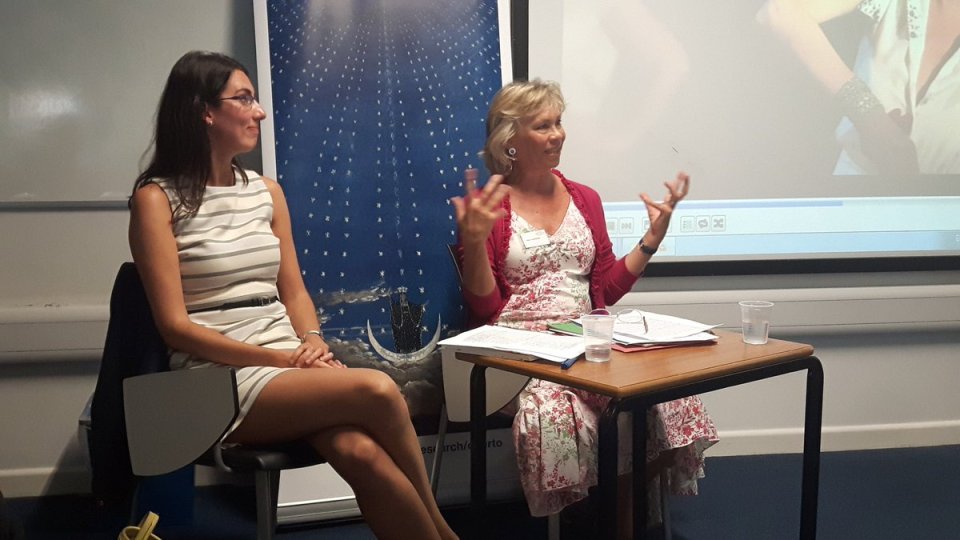Conference Report, OBERTO 2016: Operatic Acting
The sixth annual OBERTO conference took place on 8 September 2016, welcoming to Oxford Brookes a diverse international mixture of more than 50 academics, singers, directors, critics and members of the public. This year’s theme was operatic acting and the conference set out to examine the manifold ways in which acting, singing, movement, body image, drama and dramaturgy interact on the operatic stage.
Ben Davis (Cardiff University) began with a paper about the concept of realism in opera, which drew upon the writings of Stanislavski in order to establish a theoretical framework that would prove useful throughout the day’s discussions. Davis drew upon his practice as an opera director, with Written on Skin as his case study, shedding light upon the ways in which directors mark up an operatic score as part of the production process. Kara McKechnie (University of Leeds) also reflected upon personal experience of her work as a dramaturg at Opera North in a paper on the ways in which singers ‘perform’ when backstage and during the rehearsal process, as shown in ‘behind-the-scenes’ documentaries.
Six historical case studies followed, organised into two parallel sessions. In a session with a nineteenth- and early twentieth-century focus, Helen Metzelaar (University of Amsterdam) told the fascinating story of the Devries family, a dynasty of Dutch opera singers who established considerable success across Europe during the nineteenth century, creating some landmark roles and drawing comparison in their interpretation of them with the great tragic actresses of the day. This established a link to the paper by Enza De Francisci (University College London), who compared the contemporaneous reception of the Italian actress Eleonora Duse and the French opera singer Emma Calvé, who both performed the role of Santuzza in London at the same time, in Verga’s play and Mascagni’s opera respectively. Alexandra Wilson (Oxford Brookes University) moved the discussion into the twentieth century, examining how star singers of the 1920s adapted their performance style (both on and off stage) in response to early film.
The parallel session was opened by Clemens Risi (Friedrich-Alexander-Universität Erlangen-Nuremberg), who demonstrated that typical gestures displayed by singers – which have often been criticised for being stereotypical and repetitive – are rooted not only in 18th- and 19th-century ideas of rhetoric and acting, but also in vocal coaching techniques. Mark Berry (Royal Holloway, University of London) drew a parallel between two ‘singing actresses’ past and present: Wilhelmine Schröder-Devrient, who inspired Richard Wagner’s operas and theoretical writings, and Waltraud Meier, one of the outstanding Wagner singers of the present. Laura Moeckli (Basel) introduced the concept of ‘disjunction’: as French treatises on acting show, the option of acting against the grist of the stage action or plot situation was already an option in the early 19th century; compositional traces can be found in Meyerbeer’s operas.
After lunch, drama tutor Norman Cooley showcased some of the techniques he uses in training singers to act, a session that was made engaging through audience participation. A lively discussion followed in the subsequent session on ‘bodies’. In a memorably titled paper (‘Fat Butch Orfeo’), Heather Hadlock (Stanford University) analysed the idea that mainstream body norms and beauty standards do not apply in the operatic world, concluding that the rare fat butch figure in opera retains a genuinely subversive, anti-normative energy. Hugo Shirley’s (Gramophone) paper continued the theme of body image, revisiting the so-called ‘Dumpygate’ controversy that surrounded the reception of Tara Erraught’s performance as Octavian in the Glyndebourne Festival production of Der Rosenkavalier in 2014.
The discussion then turned away from individual to collective acting, with a session on the chorus. Ryan Minor (SUNY Stonybrook) amused everyone with his anecdotes of wooden chorus acting at a certain well-known American opera house, before looking back to the eighteenth century to take a historical perspective on the problematic question of group acting. Katarina Aronsson then discussed some innovative directorial choices at the Royal Swedish Opera, where she is dramaturg, which were designed to showcase the chorus in innovative and convincing ways.

Singers Adriana Festeu (L) and Sally Burgess (R)
The conference ended with an ‘in conversation’ panel, in which mezzo sopranos Sally Burgess and Adriana Festeu discussed their experiences of operatic acting, and the ways in which they prepare for a role. The discussion focused particularly upon acting the role of Carmen, recently sung by Adriana and a signature role of Sally’s, and it was a treat to watch video clips of both in action. The session was ably chaired Karen Henson (Frost School of Music, University of Miami), who brought her historical knowledge of the singer who created the role of Bizet’s anti-heroine to bear upon the conversation.
Throughout the day, there was much opportunity for lively discussion, both in response to the formal presentations and informally during the breaks. Thanks to the diverse mix of participants, there was a lively intermingling of historical perspectives on operatic acting, theoretical analyses and pragmatic sharing of experiences – something that has become a trademark of the annual OBERTO conferences.
